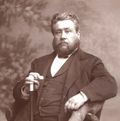With him is an arm of flesh; but with us is the LORD our God to help us, and to fight our battles. And the people rested themselves upon the words of Hezekiah king of Judah.(2 Crónicas 32:8)
After this did Sennacherib king of Assyria send his servants to Jerusalem, (but he himself laid siege against Lachish, and all his power with him,) unto Hezekiah king of Judah, and unto all Judah that were at Jerusalem, saying,(2 Crónicas 32:9)
Thus saith Sennacherib king of Assyria, Whereon do ye trust, that ye abide in the siege in Jerusalem?(2 Crónicas 32:10)
Doth not Hezekiah persuade you to give over yourselves to die by famine and by thirst, saying, The LORD our God shall deliver us out of the hand of the king of Assyria?
Hath not the same Hezekiah taken away his high places and his altars, and commanded Judah and Jerusalem, saying, Ye shall worship before one altar, and burn incense upon it?(2 Crónicas 32:12)
Know ye not what I and my fathers have done unto all the people of other lands? were the gods of the nations of those lands any ways able to deliver their lands out of mine hand?(2 Crónicas 32:13)
Who was there among all the gods of those nations that my fathers utterly destroyed, that could deliver his people out of mine hand, that your God should be able to deliver you out of mine hand?(2 Crónicas 32:14)
Otras publicaciones relacionadas con "2 Crónicas 32:11":
2 Crónicas 32:11 - Referencia Cruzada
In the LORD put I my trust: how say ye to my soul, Flee as a bird to your mountain? (Salmos 11:1)
Beware lest Hezekiah persuade you, saying, the LORD will deliver us. Hath any of the gods of the nations delivered his land out of the hand of the king of Assyria? (Isaías 36:18)
But Rabshakeh said unto them, Hath my master sent me to thy master, and to thee, to speak these words? hath he not sent me to the men which sit on the wall, that they may eat their own dung, and drink their own piss with you? (2 Reyes 18:27)
But Rabshakeh said, Hath my master sent me to thy master and to thee to speak these words? hath he not sent me to the men that sit upon the wall, that they may eat their own dung, and drink their own piss with you? (Isaías 36:12)
He trusted in God; let him deliver him now, if he will have him: for he said, I am the Son of God. (Mateo 27:43)
As with a sword in my bones, mine enemies reproach me; while they say daily unto me, Where is thy God? (Salmos 42:10)
Many there be which say of my soul, There is no help for him in God. Selah. (Salmos 3:2)
Now therefore let not Hezekiah deceive you, nor persuade you on this manner, neither yet believe him: for no god of any nation or kingdom was able to deliver his people out of mine hand, and out of the hand of my fathers: how much less shall your God deliver you out of mine hand? (2 Crónicas 32:15)
Saying, God hath forsaken him: persecute and take him; for there is none to deliver him. (Salmos 71:11)
Neither let Hezekiah make you trust in the LORD, saying, The LORD will surely deliver us, and this city shall not be delivered into the hand of the king of Assyria. (2 Reyes 18:30)
He trusted on the LORD that he would deliver him: let him deliver him, seeing he delighted in him. (Salmos 22:8)
Thus shall ye speak to Hezekiah king of Judah, saying, Let not thy God in whom thou trustest deceive thee, saying, Jerusalem shall not be delivered into the hand of the king of Assyria. (2 Reyes 19:10)


